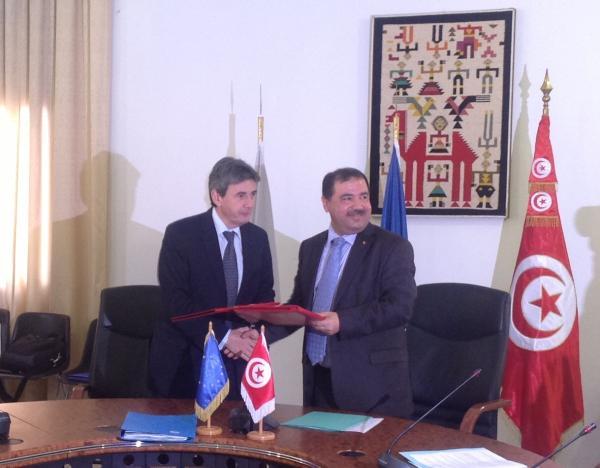
Aware of the social and democratic ramifications of Tunisia’s development priorities, the Board of Directors of the European Investment Bank (EIB) has decided to commit €270m in favour of employment, particularly of young people, small and medium-sized enterprises (SMEs) and infrastructure in the poorest districts. The first step in enabling this commitment to rapidly become operational was the signature today, 20 December, of two finance contracts totalling €170m, which will be followed in 2013 by the final €100m tranche.
These are key financing operations for Tunisia, which is faced with the growing requirement to develop SMEs, thereby creating employment for young people, and with the need to rehabilitate the poorer parts of towns and cities. In addition to supplying its technical and financial expertise, the EIB, in accordance with the undertaking given following the Revolution (which has resulted in finance totalling nearly €500m being made available since February 2011), is required to provide a targeted and concrete response to the aspirations of the Tunisian people.
For a more diversified private sector, which will create jobs
The focus of the €100m finance contract signed today is the private sector, which will lay the basis for future growth and for generating employment. The aim is to meet the twofold challenge of developing SMEs involved in the crucial area of production and making them more competitive. This new line of credit, which will be made available in close collaboration with Tunisian banks and leasing companies, should encourage the emergence of new job-creating businesses as a result of easier access to finance. This should enable support to be provided for 200 projects in various productive areas of the private sector, thereby generating more than 10 000 jobs.
This is a priority project both for the new Tunisian authorities and for the EIB, which since 1998 has provided the private sector with €550m via lines of credit. This new €100m commitment was signed at the Tunisian Ministry for Investment and International Cooperation by EIB Vice-President Philippe de Fontaine Vive and, on behalf of the partner banks, by Mr Houssein Mouelhi, CEO of Banque Tuniso-koweitienne, Mr Ahmed El Karm, Chairman of Amen Bank’s Executive Board, Mr Hicham Seffa, CEO of Attijari Bank, Mr Mohamed Habib Ben Saad, CEO of Banque de Tunisie, Mr Kamel Habbachi, CEO of Attijari Leasing, and Mr Fethi Mestiri, CEO of Tunisie Leasing.
For successful rehabilitation of the poorer areas, which will contribute to social cohesion
In order to improve the daily living conditions of residents of the poorer areas, the EIB decided to support Tunisia’s local authorities in addressing the need for urban rehabilitation and social cohesion, including water and wastewater networks, surfacing and providing drainage for roads, the development of power networks or the construction of playgrounds and sports and sociocultural complexes.
In practical terms the €70m loan will enable public infrastructure to be rehabilitated and modernised in 119 poor urban areas across Tunisia’s 24 regions (“gouvernorats”). Technical assistance amounting to €2m is also being proposed by the EIB to help the promoter in carrying out and managing this project. Schemes will also be embarked upon to encourage employment during and after the rehabilitation period, and promote energy efficiency in buildings and efficient waste management .
The €70m urban rehabilitation finance contract was also signed today at the Tunisian Ministry for Investment and International Cooperation by Mr Riadh Bettaieb, Minister for Investment and International Cooperation, and EIB Vice-President Philippe de Fontaine Vive in the presence of Mr Mohamed Arfaoui, CEO of the Agency for Rehabilitation and Urban Renovation. Agence Française de Développement and the European Commission, the EIB’s partners in this financing operation, were also present.
At the signing ceremony Mr de Fontaine Vive said: “Our aim is to support the new Tunisia’s democratic and economic transition through projects to encourage growth and employment for young people, development and the modernisation of infrastructure. This was the pledge we made to the people of Tunisia following the Revolution. Through this action we will be improving the daily life of Tunisians. We are preparing the future of the younger generations.”

Photographer: EIB ©To be defined
Download original